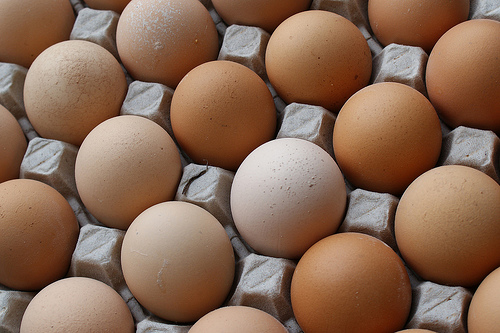
The other day someone asked me why they should bother paying more for eggs. What makes better eggs "better"? Is it worth the cost?
First of all I feel obliged to point out that we're only talking about a dollar or two per dozen eggs. It's not like the difference in cost between a 10 year-old Hyundai and a brand-new BMW. I definitely feel you on the rising cost of food, and a dollar or two here or there can add up quickly. But let's keep things in perspective.
My friend buys 18-packs of eggs from an egg producer who - like almost all egg producers in America - employs a system of battery cages. So there is the cruelty aspect. There is no real reason to make a hen spend her entire life in a cage the size of a shoebox beyond human convenience. The battery cage system also promotes disease, which can drastically impact the quality of the eggs.
Personally I'm willing to pay an extra dollar to know that my breakfast wasn't the direct result of an animal's suffering. But everyone gets to make their own decisions in life.
Second is the issue of age. Cheaper eggs, in my experience, tend to be older eggs. You can tell the age of an egg by the quality of the yolk and white. The older an egg gets, the more runny the white becomes. The eggs you buy at the store can be up to 90 days old. The quality degrades markedly in that time.
And finally there is the nutritional aspect. Good feed creates a more nutritious egg, but good feed costs more money than cheap feed. That cost is passed along to the consumer. But it makes a big difference in the nutritional content of the eggs you eat: increased protein, reduced cholesterol, and more healthy omega-3 fatty acids.
As far as I'm concerned, there is a big difference between a $2 dozen of eggs and a $4 dozen of eggs, and I am happy to pay the extra two bucks for the better product.
Image courtesy Flickr/pietroizzio

2 comments